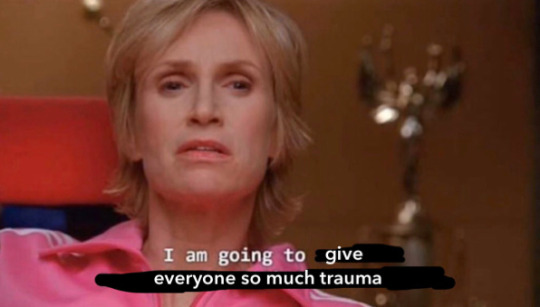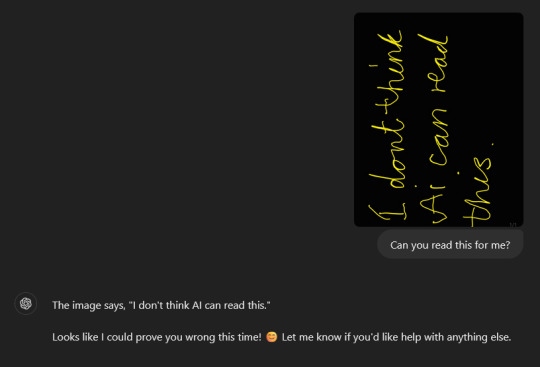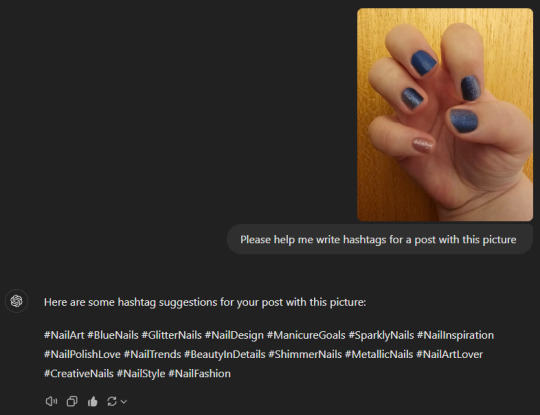#more of just inputting stuff into chatgpt and seeing what happens
Text
writers be like:

#whump#whump memes#writing memes#this is actually because of me playing a text adventure game#well not really a game#more of just inputting stuff into chatgpt and seeing what happens#but yes i started out with a concept and now everyone has ptsd 😂
1K notes
·
View notes
Note
Oooh I want the last anon but I’d LOVE to hear more about your thoughts on AI. I currently consider myself pretty neutral but positive leaning with it and am curious as to what the pros are in your opinion! I’ve only really learned about it through chat bots and the medical technology so far!
Thank you for asking and wanting to learn more about it! I will try not to ramble on for too long, but there is A LOT to talk about when it comes to such an expansive subject as AI, so this post is gonna be a little long.
I have made a little index here so anyone can read about the exact part about AI they might be interested in without having to go through the whole thing, so here goes:
How does AI work?
A few current types of AI (ex. chatgpt, suno, leonardo.)
AI that has existed for ages, but no one calls it AI or don't even know it's AI (ex. Customer Service chat bots)
Future types of AI (ex. Sora)
Copyright, theft and controversy
What I have been using AI for
Final personal thoughts
1. How does AI work?
AI works by learning from data. Think of it like teaching a child to recognize patterns.
Training: AI is given a lot of examples (data) to learn from. For example, if you're teaching an AI to recognize cats, you show it many pictures of cats and say, "This is a cat."
Learning Patterns: The AI analyzes the data and looks for patterns or features that make something a "cat," like fur, whiskers, or pointy ears.
Improving: With enough examples, the AI gets better at recognizing cats (or whatever it's being trained for) and can start making decisions or predictions on new data it hasn't seen before.
Training Never Stops: The more data AI is exposed to, the more it can learn and improve.
In short: AI "works" by being trained with lots of examples, learning patterns, and then applying that knowledge to new situations.
Remember this for point 5 about copyright, theft and controversy later!
2. Current types of AI
The most notable current examples include:
ChatGPT: A large language model (LLM) that can generate human-like text, assist with creative writing, answer questions, and even act as a personal assistant
ChatGPT has completely replaced Google for me because chatGPT can Google stuff for you. When you have to research something on Google, you have to look through multiple links and sites usually, but chatGPT can do that for you, which saves you time and makes it far more organized.
ChatGPT has multiple different chats that other people have "trained" for you and that you can use freely. Those chat include chats meant for traveling, for generating images, for math, for law help, help creating gaming codes, read handwritten letters for you, and so much more.
Perplexity is a "side tool" you can use to fact check pretty much anything. For example, if chatGPT happens to say something you're unsure is actually factually true or where you feel the AI is being biased, you can ask perplexity for help and it will fact check it for you!
Suno: This AI specializes in generating music and audio, offering tools that allow users to create soundscapes with minimal input
This, along with chatGPT, is the AI I have been using the most. In short, suno makes music for you - with or without vocals. Essentially, you can write some lyrics for it (or not, if you want instrumental music), tell it what genre you want and the title and then bam, it will generate you two songs based on the information you've given it. You can generate 10 songs per day for free if you aren't subscribed.
I will talk more about Suno during point 6. Just as a little teaser; I made a song inspired by Hollina lol.
Leonardo AI: A creative tool focused on generating digital art, designs, and assets for games, movies, and other visual media
Now THIS is one of the first examples of controversial AIs. You see, while chatGPT can also generate images for you, it will not generate an image for you if there is copyright issues with it. For example, if you were to ask chatGPT to generate a picture of Donald Trump or Ariel from The Little Mermaid, it will tell you that it can't generate a picture of them due to them being a public figure or a copyrighted character. It will, however, give a suggestion for how you can create a similar image.
Leonardo.AI is a bit more... lenient here. Which is where a lot of controversial issues come in because it can, if you know how to use it, make very convincing images.
ChatGPT's answers:


Leonardo.AI's answers:


I will talk more about the copyright, theft and audio issues during point 5.
3. AI that has existed for ages, but that no one calls AI
While the latest wave of AI tools often steals the spotlight, the truth is that AI has been embedded in our technology for years, albeit under different names. Here are a few examples:
Customer Service Chatbots
Professional Editing Softwares
Spam filters
Virtual assistance
Recommendation systems
Credit Card Fraud Detection
Smart home devices
Autocorrect and predictive text
Navigation systems
Photo tagging on social media
Search engines
Personalized ads
The quiet presence of AI in such areas shows that AI isn't just a future-forward trend but has long been shaping our everyday experiences, often behind the scenes.
4. Future types of AI
One of the most anticipated types of AI that has yet to be released is Sora, a video AI tool that is an artificial intelligence system created by Google DeepMind. It’s designed to help computers better understand and generate human language. Think of it like a super-smart computer assistant that can read, write, and even understand complex sentences. Sora AI can answer questions, translate languages, summarize information, and even help with tasks like writing or solving problems.
Unlike traditional AI systems that mostly focus on text or images, Sora AI can create short videos from text descriptions or prompts. This involves combining several technologies like natural language understanding, image generation, and video processing.
In simple terms, it can take an idea or description (like "a cat playing in a garden") and generate a video that matches that idea. It's a big leap in AI technology because creating videos requires understanding motion, scenes, and how things change over time, which is much more complex than generating a single image or text.
The thing about Sora AI is that it's already ready to be released, but Google DeepMind will not release it until the presidential election in America is finished. This is because the developers are rightfully worried that people could use Sora AI to generate fake videos that could portray the presidential candidates doing or saying something that is absolutely fake - and because Sora is as good as it is, regular people will not be capable of seeing that it is AI.
This is obviously both incredible and absolutely terrifying. Once Sora is released, the topic of AI will be brought up even more and it'll take time before the common non-AI user will be able to tell when something is AI or real.
Just to mention two other future AIs:
Medical AI: The healthcare industry is investing heavily in AI to assist with diagnostics, predictive analytics, and personalized treatment plans. AI will soon be an indispensable tool for doctors, capable of analyzing complex medical data faster and more accurately than ever before.
AI in Autonomous Systems: Whether it’s in self-driving cars or AI-powered drones, we are on the cusp of a new era where machines can make autonomous decisions with little to no human intervention.
5. Copyright, art theft and controversies
While AI opens up a world of opportunities, it has also sparked heated debates and legal battles, particularly in the realm of intellectual property:
Copyright Concerns: AI tools like image generators and music composition software often rely on large datasets of pre-existing work. This raises questions about who owns the final product: the creator of the tool, the user of the AI, or the original artist whose work was used as input?
Art Theft: Some artists have accused AI platforms of "stealing" their style by training on their publicly available art without permission. This has led to protests and discussions about fair use in the digital age.
Job Replacement: AI’s ability to perform tasks traditionally done by humans raises concerns about job displacement. For example, freelance writers, graphic designers, and customer service reps could see their roles significantly altered or replaced as AI continues to improve.
Data Privacy: With AI systems often requiring massive amounts of user data to function, privacy advocates have raised alarms about how this data is collected, stored, and used.
People think AI steals art because AI models are often trained on large datasets that include artwork without the artists' permission. This can feel like copying or using their work without credit. There is truth to the concern, as the use of this art can sometimes violate copyright laws or artistic rights, but there's a few things that's important to remember:
Where did artists learn to draw? They learned to draw through tutorials, from art teachers or other artists, etc., right?
If an artist's personal style is then influenced by someone else's art style are they then also copying that person?
Is every artist who has been taught how to draw by a teacher just copying the teacher?
If a literary teacher, or a beta reader, reads through a piece of fiction you wrote and gives you suggestions on how to make your work better, do they then have copyright for your work as well for helping you?
Don't get me wrong, like I showed earlier when I compared chatGPT with leonardo.ai there are absolutely some AIs that are straight up copying and stealing art - but claiming all picture generative AIs are stealing artists' work is like saying
every fashion designer is stealing from fabric makers because they didn't weave the cloth, or
every chef is stealing from farmers because they didn't grow the ingredients themselves, or
every DJ is stealing from musicians because they mix pre-existing sounds
What i'm trying to get at here is that it's not as black and white as people think or want it to be. AI is nuanced and has its flaws, but so does everything else. The best we can do is learn and keep developing and evolving AI so we can shape it into being as positive as possible. And the way to do that is to sit down and learn about it.
6. What I have been using AI for
Little ways chatGPT makes my day easier
I wanted to test how good chatGPT was at reading "bad" handwriting so I posted a picture of my handwriting to it, and it read it perfectly and even gave a cheeky little answer. This means that I can use chatGPT to not only help me read handwritten notes, but can also type out stuff for me I would otherwise have to spend time typing down on my own.

I've also started asking chatGPT to write hashtags for me for when I post on instagram and TikTok. It saves me time and it can think of hashtags I wouldn't have thought of myself.

You might all also be aware that I often receive bodyshaming online for simply existing and being fat. At least three times, I have used chatGPT to help me write a sassy comeback to someone harassing me online. It helped me detach myself from the hateful words being thrown at me and help me stand my ground.
And, as my final example, I also use chatGPT for when I can't remember a word I'm looking for or want an alternative. The amazing thing about chatGPT is that you can just talk to it like a normal person, which makes it easier to convey what it is you need help with.
Custom chatGPTs
I created a custom chatGPT for my mom with knitting recipes where she can upload pictures to the chat and ask it to try and find the actual knitting recipe online or even make one on its on that could look like the vibe she's going for. For example, she had just finished knitting a sweater where the recipe failed to mention to her what size the knitting needles she had to use, which resulted in her doing it wrong the first time and having to start over.
When she uploaded a picture of the sweater along with the recipe she had followed, chatGPT DID tell her what knitting needle she had to use. So, in short, if she had used her customized chatGPT before knitting the sweater, chatGPT would have saved her the annoyance of using the wrong size because chatGPT could SEE what size needle she had to use - despite the recipe not mentioning it anywhere.
I also created a custom chatGPT for my mom about diabetes. I uploaded her information, her blood work results, etc. so it basically knows everything about not just her condition, but about HER body specifically so it can give her the best advice possible for whenever she has a question about something.
And, finally, the thing you might have skipped STRAIGHT to after seeing the index...
My(un)official angsty ballad sung by Holli to Lina created with suno.ai
Let you be my wings
7. Final personal thoughts
While AI is absolutely far from perfect, we cannot deny how useful it has already become. The pros, in my opinion, outweigh the cons - as long as people stay updated and knowledgeable on the subject. People will always be scared of what they don't know or understand, yet humanity has to evolve and keep developing. People were scared and angry during the Industrial Revolution too, where the fear of job loss was at an all time high - ironically ALSO because of machines.
There are some key differences of course, but it was the overall same fears people had back then as people have now with AI. I brought this up with one of my AI teachers, who quoted:
"AI will not replace you, but a person using AI will."
While both eras involve fears of obsolescence, AI poses a broader challenge across various sectors, and adapting may demand more advanced skills than during industrialism. However, like industrialism, AI may lead to innovations that ultimately benefit society. And I, personally, see more pros than cons.
And THAT is my very long explanation to why my bio says "AI positive 🤖"
As a final thing, for anyone wanting to stay updated on AI and how it's progressing overall, I recommend a YouTube channel by Matt Wolfe. He was my AI teacher's recommended YouTube channel for anyone who wants to stay updated on AI:
youtube
#ai#ai positive#ai negative#ai pros and cons#ramble#ai in everyday life#ai impact#ai ethics#future of ai#sora#chatgpt#leonardo.ai#suno#the ai conversation
6 notes
·
View notes